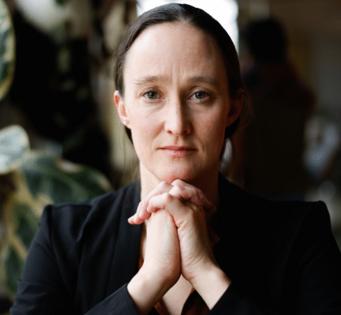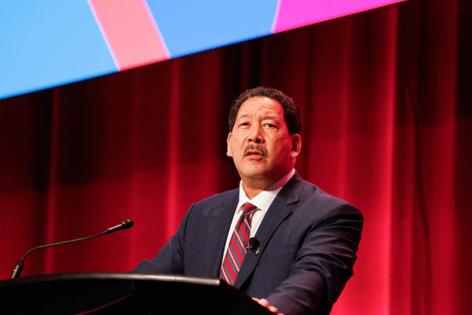Seattle mayoral race explained: Why Mayor Bruce Harrell is behind and what happens next
Published in News & Features
SEATTLE — In the early days of 2025, Seattle Mayor Bruce Harrell was viewed as the overwhelming favorite to win reelection. His polling numbers were decent, his possible challengers were few and he’d consolidated support from both moderate and progressive figures in Washington politics.
Then came Tuesday’s primary election.
Harrell is trailing Katie Wilson, general secretary of the left-wing Tenant Riders Union. The results, which are likely to worsen for Harrell as more ballots are counted, threw out any notion that a second Harrell term was inevitable and, in fact, made him the underdog heading into the general election. As of Wednesday, Wilson was at 48% and Harrell at 43.5%.
Sandeep Kaushik, political consultant and lobbyist, said everything changed for Harrell when President Donald Trump was sworn in to his second term.
“Prior to Trump taking office, the assumption was the mayor was sailing to reelection, and now he’s in a fight for his political life,” he said.
Trump’s return may have spurred Seattle voters to return to their more progressive roots after dabbling in a slightly more conservative City Hall for the past four years, Kaushik said. More than that, though, Trump has spurred a broader backlash.
“I also think that the downstream effect of that is it’s also creating a general anti-incumbent environment,” he said.
Harrell has made the pitch to voters that he’s the best against Trump, touting a recent lawsuit against the administration, filed days before the primary.
Wilson, whose resume as a progressive organizer is largely unknown to many voters, decided to jump into the race after a special city election in February. Voters agreed to tax high-paying companies to pay for new public housing. Harrell backed an alternative proposal, which did not include new taxes.
That vote told a bigger story of local politics in Trump’s second term, said Heather Weiner, consultant with PowerHouse Strategic who ran Lorena Gonzalez’s unsuccessful mayoral campaign against Harrell in 2021. Large businesses in the region who fought the tax — like Amazon, Microsoft and T-Mobile — have lost trust among local voters as they take a more conciliatory approach to Trump in his second term.
“The moment now is one where we’re very concerned about the descent of corporate-controlled fascism,” she said.
In turn, anyone seen to be associated with those corporations is likely hurting electorally, she said. The candidates seen as more closely aligned with business, like City Council President Sara Nelson and City Attorney Ann Davison, did poorly across the board in the primary.
This is a significant change politically from what Harrell faced when he won in 2021. That election represented the beginning of an overwhelming backlash to the progressive politics of City Hall that voters blamed for causing the decline of the Seattle Police Department and increases in crime. Public safety was the top priority that year, as it was in 2023, and talk of defunding the police became toxic.
“In 2021, we were still in the grip of the pandemic, crime was super high and voters very clearly wanted a change from what they viewed as status quo,” said Michael Fertakis, consultant with Upper Left Strategies who’s running Girmay Zahilay’s campaign for King County executive.
That cycle was followed by a 2023 election that broke even harder toward a public safety-oriented City Hall, sweeping in six new City Council members who pledged to reverse the direction of their predecessors.
In the years since, the council and mayor have indeed made that their focus, increasing signing bonuses for new police officers and creating “stay out” zones focused on drugs and prostitution.
Through the 2025 campaign, Harrell has leaned on that success, touting the improved staffing of the Police Department and declining crime. He’s resurfaced Wilson’s support for cutting the Police Department’s budget in the hopes it will turn voters away from her brand of progressive politics.
So far it hasn’t stuck. Wilson has said recently that she’s not interested in defunding the police.
“The moment has passed,” Kaushik said. “I don’t think voters believe that the cops are going anywhere. They’re not going to get defunded.”
At the same time, affordability has become increasingly important in voters’ minds. Taking a page out of Zohran Mamdani’s playbook in the New York City mayoral race, Wilson has seized on the issue — using the cost of a slice of pizza, much as Mamdani used chicken and rice, to illustrate that the city is too expensive. That’s resonated with voters.
“Katie has been able to ride the Mamdani wave and I think Katie most accurately represented the change to the status quo that voters are very clearly saying they want to see,” Fertakis said.
Despite Harrell’s rough primary showing, the race is far from over. The general election will see a much larger turnout, likely among less engaged voters. How they vote is not a given.
For Harrell, the task going forward will be to find a message in the next three months that looks forward, Kaushik said. “The mayor can do more to tell voters where he’s going to take the city. Much of the messaging was a look backward,” he said.
Fertakis agreed. “If I was them, I’d be focusing super hard on positive messaging,” he said.
For Wilson, the job is turning out the progressive base.
As Wilson celebrated her unexpected primary strength, Harrell was candid in his grappling with his campaign. He acknowledged the “angst” gripping many voters.
“People really, really want to see change because there’s a lot of fear in our lives right now,” he said.
The challenge is he’s a well-defined figure in Seattle politics, having been in City Hall for most of the last 18 years, while Wilson is still a blank slate to many voters.
©2025 The Seattle Times. Visit seattletimes.com. Distributed by Tribune Content Agency, LLC.










Comments